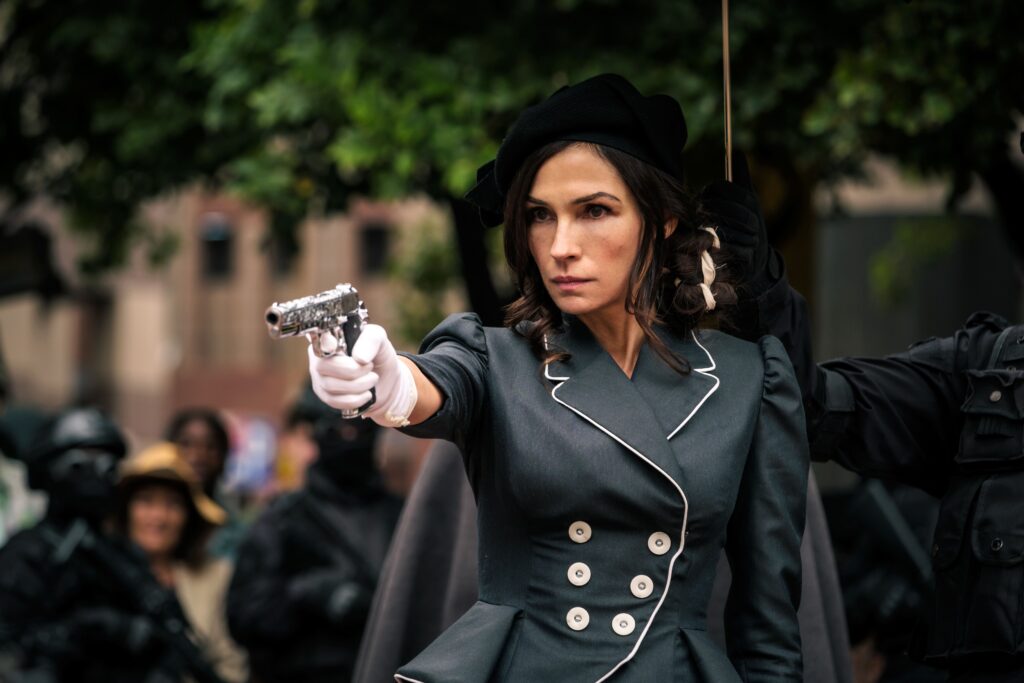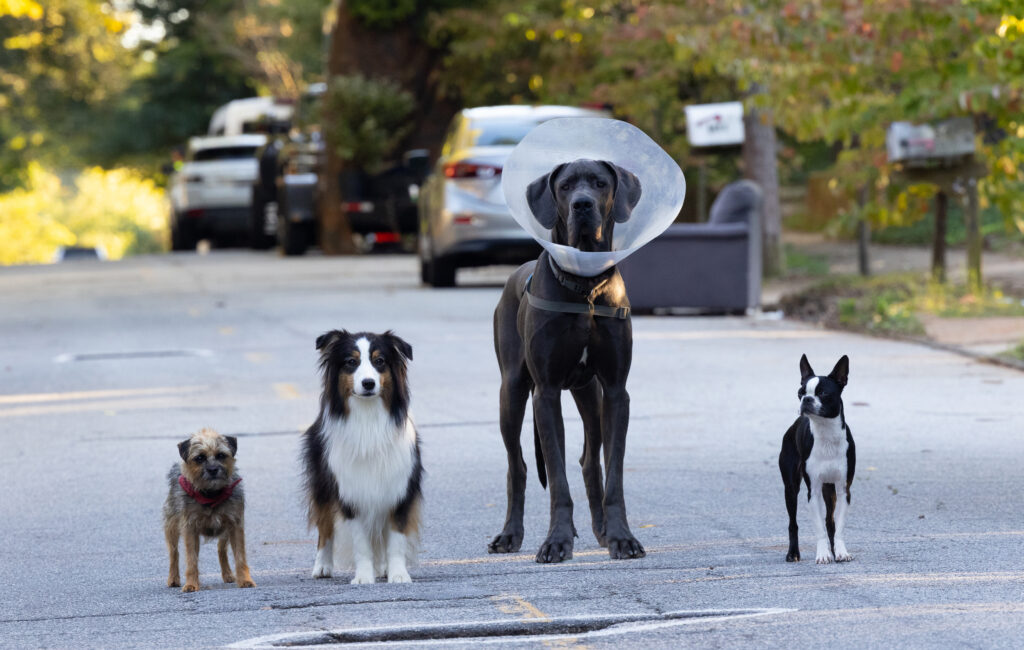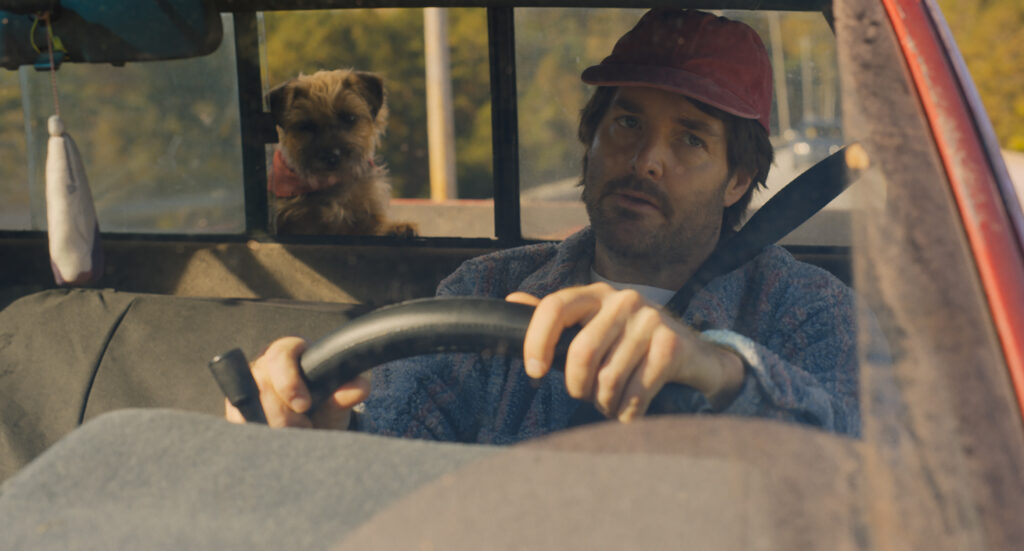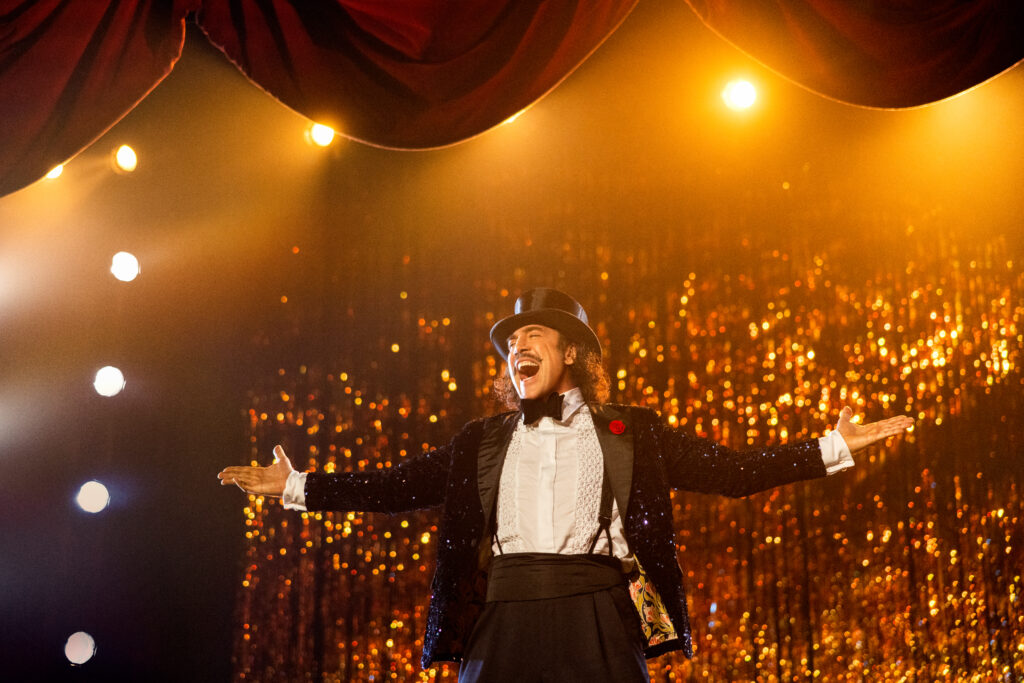April 21, 2024
by Carla Hay

Directed by Moritz Mohr
Culture Representation: Taking place in an unnamed dystopian society, the action film “Boy Kills World” features a predominantly white cast of characters (with some black people and Asian) representing the working-class, middle-class and wealthy.
Culture Clash: A deaf man, who was raised as an orphan and trained to be a warrior by a shaman, goes on a revenge mission against the tyrannical dictator whom he blames for killing his family.
Culture Audience: “Boy Kills World” will appeal primarily to people who are fans of videogame-styled action movies that have some offbeat comedy and don’t take themselves too seriously.

“Boy Kills World” is a cartoonishly violent revenge flick with touches of psychedelia and self-deprecating comedy in a dystopian society. The story drags with repetition in the middle of the movie, but a plot twist makes up for this occasional banality. This plot twist is not as predictable as another plot twist that happens around the same time.
Directed by Moritz Mohr, “Boy Kills World” was written by Tyler Burton Smith and Arend Remmers. “Boy Kills World” had its world premiere at the 2023 Toronto International Film Festival. The movie is based on director Mohr’s unreleased short film “Boy Kills World,” which has a similar concept.
In the feature-length “Boy Kills World,” which takes place in an unnamed dystopian society, a young man whose name is listed in the credits Boy (played by Bill Skarsgård) goes on a revenge mission against a tyrannical dictator named Beatrice Van Der Koy (played by Famke Janssen), whom he blames for murdering his single mother (played by Rolanda Marais) and his younger sister Mina (played by Quinn Copeland) when Boy was about 13 or 14 years old and when Mina was about 9 or 10 years old. The teenage Boy is played by twins Cameron Crovetti and Nicholas Crovetti. Beatrice is the leader of the Van Der Koy family, who have several members who also abuse their positions of power to intimidate and kill people.
Every year, this bleak society has a mass murder event called the Culling, where Beatrice orders the military to go after enemies and kill innocent people on live TV. Boy’s family got caught in the Culling crossfire. Flashbacks show that he witnessed his mother’s murder. Boy was able to escape but became deaf and mute from the attack. He was rescued and taken to a remote wooded area by a mystic whose name is listed in the credits as Shaman (played by Yayan Ruhian), who raised him in isolation and trained Boy to become a warrior skilled in martial arts.
Since Boy does not talk out loud in the movie, his inner thoughts are heard with the voice that he says was the voice of his favorite video game character. (H. Jon Benjamin does Boy’s voice in the movie.) Even in the flashback scenes where Boy is literally a boy, his voiceover is that of an adult man. Boy’s inner thought show that he can be self-deprecating and frequently sarcastic.
Boy says of the city that he left behind when he was rescued by Shaman: “This was never a great city. Hilda Vander Koy took it from us. She has a list of all of her enemies. If you’re on it, she’ll find you.” Boy adds, “Hilda took everything from me. And when I become the ultimate warrior, I’ll return the favor.”
Several scenes in “Boy Kills World” show that part of Shaman’s training includes blowing smoke from a hallucinogenic substance into Boy’s face. As a result, Boy often has psychedelic hallucinations. Boy says early on in the movie that there’s a state of being between reality and dreams. The visual effects for the psychedelia are among the more memorable aspects about this sensory overload film.
Boy frequently has visions of Mina appearing to him and talking to him and looking the same way since the last time he saw her. Boy and Mina had a very close and fun-loving relationship before their lives were torn apart. Even in his life as a vengeful warrior, Boy still gets teased and playful scolding from Mina, whom he sees as the only person in his life who truly made him happy.
During his vendetta quest, Boy encounters other members of the Van Der Koy family, including Hilda’s ruthless sister Melanie Van Der Koy (played by Michelle Dockery); Hilda’s arrogant brother Gideon Van Der Koy (played by Brett Gelman); and Melanie’s buffoonish husband Glen Van Der Koy (played Sharlto Copley), who is dominated by Melanie. (It says a lot that Glen took the Van Der Koy surname.)
The Van Der Koy family has a security chief named June27 (played by Jessica Rothe), and programmed assassin who wears a helmet and who might or might not be human. She has almost superhuman-like strength and becomes a formidable and elusive opponent to Boy. Meanwhile, Boy forms an alliance with two rebels: wisecracking Basho (played by Andrew Koji) and resourceful Bennie (played by Isaiah Mustafa), who both join in on the mayhem. Boy encounters many dangerous foes, leading to several brutal and bloody battles.
Skarsgård is quite skillful in combining the action and facial expressions required for this character who is supposed to be deaf and mute. Melanie the villain who is the most fun to watch in the movie, thanks to Dockery’s prickly performance. Janssen’s Hilda is a fairly generic and predictable villain, while Gideon and his bad jokes quickly become annoying. “Boy Kills World” is by no means an intellectual movie, but some of the quips are amusing enough to keep most viewers entertained. The movie’s most surprising “reveal” has some imagination, which saves “Boy Kills World” from being just another violent action flick that’s a checklist of death and destruction.
Roadside Attractions and Lionsgate will release “Boy Kills World” in U.S. cinemas on April 26, 2024




